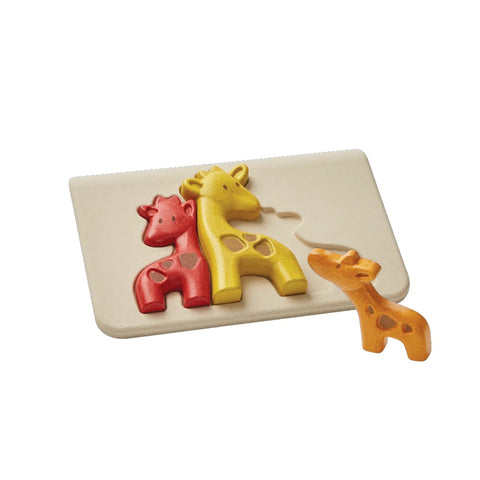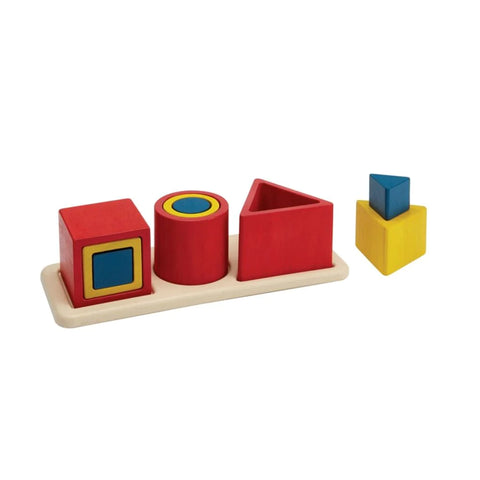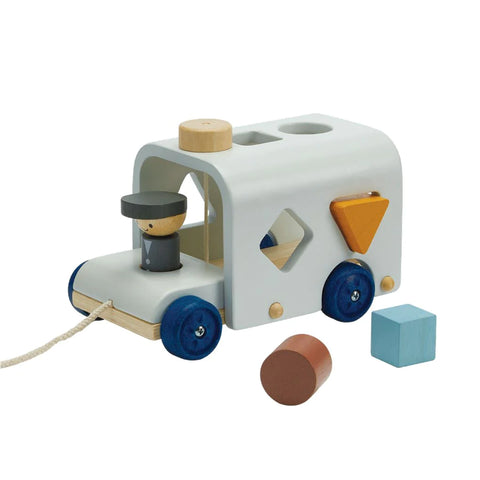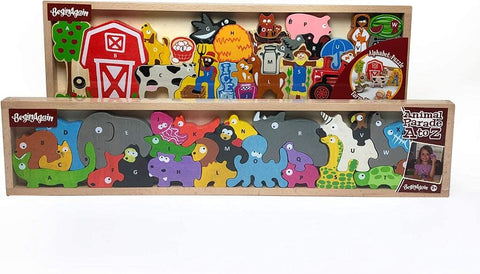Wooden puzzles are a fantastic way to develop your child’s fine motor skills, problem-solving skills, and short-term memory. They also enhance your baby’s ability to focus on one thing and teach them color and shape recognition.
And wooden puzzles are a great choice when buying used toys as they are durable and stand up to a lot of play. Read on to learn more, especially how to select the right puzzles by age.
When Can a Baby Start Doing Puzzles?
Understanding how to select the right puzzle by age is important as different puzzles are appropriate for different ages.
Children can start doing simple wooden puzzles between ages 12 and 18 months. This depends on a child’s individual development and exposure to puzzles.
According to research by the University of East Anglia, kids learn to do jigsaw puzzles when they reach a certain age. In most cases, three-year-olds will use trial and error, while 4-year-olds can use the information in the picture to complete a puzzle.
PlanToys Giraffe Puzzle and Play Set
Number of puzzle pieces by age:
12-18 months: Kids in this age group have just graduated from putting everything in their mouth to fitting them in different places. This is the age they will try to insert a pen inside their ears or an electrical outlet.
Their grasping game is on, and they can easily remove a puzzle piece from its place and fit it back, albeit with some struggle. A one-piece wooden puzzle is great for this age.
18-24 months: By the time your child is nearing two years old, they can work on a multi-piece puzzle with simple shapes. Circles are a fantastic way to start them off, and then you work your way up to other shapes or items.
As long as the wooden puzzle pieces are big enough and you are there to guide them, this toddler will be completing a simple puzzle in a matter of minutes.
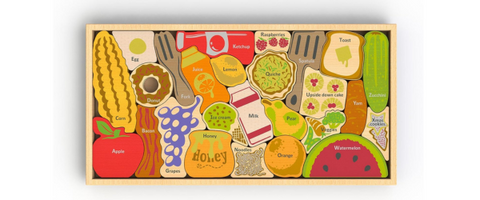 BeginAgain Alphabites A to Z Puzzle and Play Set
BeginAgain Alphabites A to Z Puzzle and Play Set
24-36 months: An introduction to jigsaw puzzles should be done right around this age. You can start with simple, oversized jigsaw puzzles like fitting different cardboard shapes together. This is also the age you start doing floor puzzles with 5-20 pieces that interconnect.
36-48 months: As the research above stated, kids over three years are eligible to start doing real puzzles with pictures.
Start with fewer pieces and show them how to put the pieces together to make one picture. It might take time to get the concept, but they will eventually grasp it with patience and daily practice.
In our Puzzles category, we have simple jigsaw puzzles fit for 3, 4, 5, and 6-year-old kids who are just starting to learn the puzzle game.
What Types of Puzzles Are Best for Infants?
Around the age of 10 months, your baby learns how to use their thumb and index finger to grasp things. This is when you should introduce them to simple baby puzzles that can work out the child’s fine motor skills.
The best wooden puzzles for infants are toys known as shape sorters like the PlanToys Sorting Bus. Your child will basically place small cubes/shapes into a large shape.
These wooden or plastic blocks are big and therefore easy to grasp. Start with a one-piece shape sorter where the child just puts that one piece inside the space and then graduate to a bigger piece with different shapes.
At first, they will use trial and error to try and fix the pieces, but they will learn which shape goes where in time.
Another great puzzle for infants is a stacking toy. Your child will stack the pieces up and make mistakes before they learn how to stack them in the right order.
PlanToys Nesting Puzzle - Unit Plus
How Do You Introduce a Toddler to Wooden Puzzles?
The beautiful thing about play is that kids will teach themselves the skills if you provide the material. Toddlers exposed to puzzles from a young age learn how to work them through trial and error.
You can, of course, show the child how to fit pieces in their place and get them interested in the game, but they will learn the rest on their own.
The secret is to start them early and make sure there are puzzles in the house all the time. It’s also critical that you get the child an age-appropriate puzzle.
The best wooden puzzle for toddlers is one they can complete in a relatively short time and with minimal difficulty. If it’s too hard, the child will get discouraged and hate puzzles. If it’s too easy, the kids won’t be challenged at all, so it’s important to have a balance.
PlanToys Sorting Bus
Some starter toddler puzzles include:
- Shape sorters
- Shape puzzles
- Peg puzzles
- Simple jigsaw puzzles
- Construction blocks and stacking toys
- Lego Duplos
How Do Puzzles Help in Child Development?
Selecting the right puzzles by age can aid childhood development in many ways. There is a direct correlation between completing puzzles and a child’s ability to learn and write.
The development of fine and gross motor skills, as well as hand-eye coordination, become the basis for everything a child is able to do physically. Puzzles are also great for developing visual perception. Your child will learn about colors, shapes, patterns, and depth perception even before they set foot in class.
Puzzles are also great for developing visual perception. Your child will learn about colors, shapes, patterns, and depth perception even before they set foot in class.
Mentally, puzzles aid in developing short-term memory, concentration, perseverance, and patience. They also work on critical thinking and problem-solving skills, which will come in handy when doing mathematics and other subjects later on.
Puzzles also teach kids the concept of success and self-confidence. The more the child succeeds in completing puzzles, the more self-confidence they have, which leads to success in other areas.
waytoplay Ringroad Flexible Track Set
Lastly, puzzles for toddlers expose kids to social skills such as teamwork, sharing, and collaboration. They learn early on how to yield to the other person when it’s right and when to take your place.
Boost Brain Power through Play
The short-term and long-term benefits of puzzles are well documented. Besides the ones we have mentioned above, research from the University of Michigan shows that a person’s IQ could be boosted by four points after spending only 25 minutes a day solving puzzles.
Now that’s a great way to boost brain power through play! Get your puzzles and other used toys from a reliable local outlet, or online from Toycycle's used toy shop.


